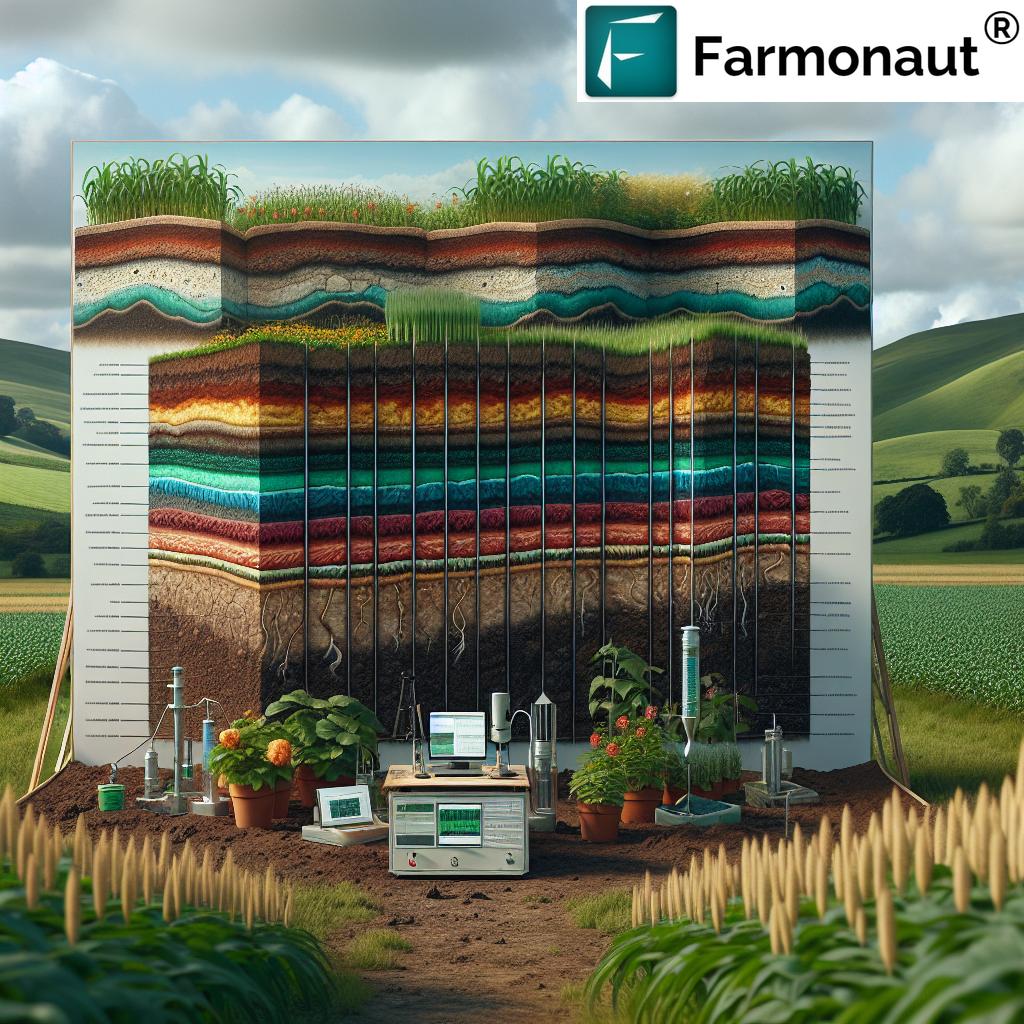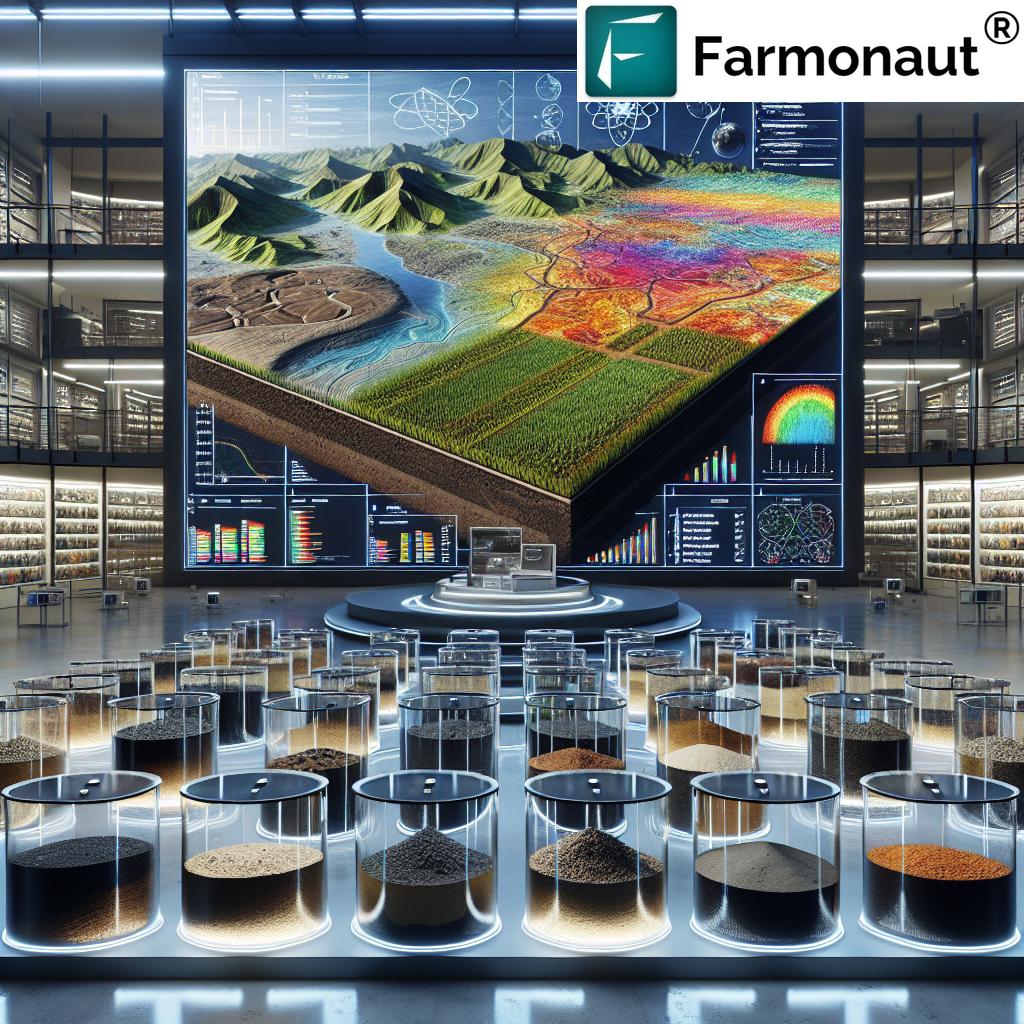Mastering Soil Science: 10 Essential Terms for Sustainable Farming and Precision Agriculture
“Soil scientists recognize up to 6 distinct horizons in a typical soil profile, each with unique characteristics.”

Welcome to our comprehensive guide on soil science terms essential for sustainable farming and precision agriculture. At Farmonaut, we believe that understanding the intricacies of soil is crucial for optimizing crop production and implementing effective agricultural practices. In this blog post, we’ll delve into ten fundamental soil science concepts that every farmer, agronomist, and agricultural enthusiast should know.
Before we dive in, let’s explore how Farmonaut’s advanced satellite-based farm management solutions can revolutionize your farming practices. Our platform offers real-time crop health monitoring, AI-based advisory systems, and resource management tools to help you make informed decisions and improve your farm’s productivity.
Check out our services:
1. Soil Horizon
A soil horizon is a layer of soil with distinct characteristics that develop over time due to various soil-forming processes. Understanding soil horizons is crucial for agricultural soil analysis and implementing sustainable farming practices.
- O Horizon: The topmost layer, consisting primarily of organic matter
- A Horizon: The surface soil, rich in organic matter and minerals
- B Horizon: The subsoil, where minerals and clay accumulate
- C Horizon: The layer of weathered parent material
- R Horizon: The bedrock layer
Farmonaut’s satellite-based crop health monitoring system can help farmers assess the health of their topsoil and make informed decisions about soil management practices.
2. Soil Fertility
Soil fertility refers to the ability of soil to support plant growth by providing essential nutrients. It’s a key factor in crop production techniques and sustainable farming practices.
- Macronutrients: Nitrogen (N), Phosphorus (P), Potassium (K)
- Secondary nutrients: Calcium (Ca), Magnesium (Mg), Sulfur (S)
- Micronutrients: Iron (Fe), Manganese (Mn), Zinc (Zn), Copper (Cu), Boron (B), Molybdenum (Mo)
Our Jeevn AI Advisory System can provide personalized recommendations for maintaining optimal soil fertility based on real-time data and expert analysis.
3. Soil pH
“Soil pH ranges from 0 to 14, with 6.0 to 7.0 being optimal for most crops.”
Soil pH is a measure of soil acidity or alkalinity, which affects nutrient availability and microbial activity. It’s a crucial factor in soil health management and precision agriculture technology.
- Acidic soil: pH below 7.0
- Neutral soil: pH of 7.0
- Alkaline soil: pH above 7.0
Farmonaut’s platform can help you monitor soil pH levels and provide guidance on appropriate amendments to optimize your soil’s pH for better crop growth.
4. Organic Matter
Soil organic matter consists of decomposed plant and animal residues, living soil organisms, and humus. It plays a vital role in soil fertility, water retention, and overall soil health.
- Benefits of organic matter:
- Improves soil structure
- Enhances water-holding capacity
- Provides nutrients for plants
- Supports beneficial soil microorganisms
Our satellite-based crop monitoring system can help you track changes in organic matter content over time, allowing you to make informed decisions about soil management practices.
5. Nutrient Management
Effective nutrient management is essential for sustainable farming practices and optimizing crop production. It involves balancing nutrient inputs with crop requirements to maximize yields while minimizing environmental impact.
- Key components of nutrient management:
- Soil testing
- Fertilizer selection and application
- Crop rotation
- Cover cropping
Farmonaut’s AI-powered advisory system can provide personalized nutrient management recommendations based on real-time soil and crop data.

6. Soil Taxonomy
Soil taxonomy is the classification system used to categorize soils based on their properties and characteristics. Understanding soil taxonomy is crucial for implementing effective soil conservation methods and precision agriculture techniques.
- Soil Orders: The highest level of classification, including:
- Alfisols
- Andisols
- Aridisols
- Entisols
- Gelisols
- Histosols
- Inceptisols
- Mollisols
- Oxisols
- Spodosols
- Ultisols
- Vertisols
Farmonaut’s digital soil mapping capabilities can help you identify and understand the soil types present on your farm, enabling more targeted management practices.
7. Moisture Regime
The soil moisture regime refers to the pattern of soil moisture content throughout the year. It’s a critical factor in crop production techniques and irrigation management.
- Types of moisture regimes:
- Aquic: Saturated for long periods
- Udic: Moist throughout the year
- Ustic: Seasonally dry
- Aridic: Dry for most of the year
- Xeric: Dry summers, moist winters
Our satellite-based soil moisture monitoring can help you track moisture levels in your fields, enabling more efficient irrigation practices and water management.
8. Erosion Control
Soil erosion is a significant threat to agricultural productivity and sustainability. Implementing effective erosion control measures is essential for preserving soil health and maintaining long-term farm viability.
- Common erosion control techniques:
- Contour farming
- Terracing
- Cover cropping
- Windbreaks
- Conservation tillage
Farmonaut’s platform can help you identify areas at risk of erosion and provide guidance on implementing appropriate erosion control measures.
9. Digital Soil Mapping
Digital soil mapping is the creation of spatial soil information using field and laboratory observations combined with spatial and non-spatial soil inference systems. It’s a crucial component of precision agriculture technology and agronomic decision support.
- Benefits of digital soil mapping:
- Improved understanding of soil variability
- Enhanced precision in resource management
- Better crop yield predictions
- Targeted application of inputs
Farmonaut’s advanced satellite imagery and AI-powered analysis can provide detailed digital soil maps to help you optimize your farming practices.
10. Precision Agriculture
Precision agriculture is a farming management concept that uses technology to observe, measure, and respond to inter and intra-field variability in crops. It aims to optimize returns on inputs while preserving resources.
- Key components of precision agriculture:
- GPS technology
- Remote sensing
- Variable rate technology
- Yield monitoring
- Data management and analysis
Farmonaut’s comprehensive suite of precision agriculture tools can help you implement these technologies on your farm, improving efficiency and sustainability.
Soil Science Terms Glossary
| Term | Definition |
|---|---|
| Soil Horizon | A layer of soil with distinct characteristics that develop over time due to various soil-forming processes. |
| Soil Fertility | The ability of soil to support plant growth by providing essential nutrients. |
| pH | A measure of soil acidity or alkalinity, which affects nutrient availability and microbial activity. |
| Organic Matter | Decomposed plant and animal residues, living soil organisms, and humus that contribute to soil health. |
| Nutrient Management | The practice of balancing nutrient inputs with crop requirements to maximize yields while minimizing environmental impact. |
| Soil Taxonomy | A classification system used to categorize soils based on their properties and characteristics. |
| Moisture Regime | The pattern of soil moisture content throughout the year, affecting crop growth and management practices. |
| Erosion Control | Techniques and practices implemented to prevent or reduce soil loss due to wind or water erosion. |
| Digital Soil Mapping | The creation of spatial soil information using field observations and spatial inference systems. |
| Precision Agriculture | A farming management concept that uses technology to optimize returns on inputs while preserving resources. |
Implementing Soil Science Knowledge with Farmonaut
Now that we’ve covered these essential soil science terms, it’s important to understand how you can apply this knowledge to improve your farming practices. Farmonaut’s advanced satellite-based farm management solutions can help you put this information into action.
- Real-time crop health monitoring: Our platform uses multispectral satellite images to provide insights into vegetation health (NDVI), soil moisture levels, and other critical metrics.
- AI-powered advisory system: Our Jeevn AI delivers personalized farm advice, weather forecasts, and expert crop management strategies based on real-time data analysis.
- Resource management tools: Optimize your use of water, fertilizers, and other inputs with our precision agriculture technology.
- Carbon footprint tracking: Monitor and reduce your environmental impact with our carbon footprinting feature.
By leveraging Farmonaut’s technology, you can make data-driven decisions that enhance your soil health, improve crop yields, and promote sustainable farming practices.
Farmonaut Subscriptions
Frequently Asked Questions
Q: How can Farmonaut help me improve my soil health?
A: Farmonaut provides real-time satellite data on crop health and soil conditions, allowing you to make informed decisions about soil management practices. Our AI-powered advisory system can offer personalized recommendations for maintaining optimal soil health based on your specific field conditions.
Q: Does Farmonaut offer soil testing services?
A: While Farmonaut doesn’t directly conduct soil tests, our platform can help you interpret soil test results and provide recommendations based on the data. We can also guide you on when and where to conduct soil tests for maximum effectiveness.
Q: How accurate is Farmonaut’s satellite-based crop monitoring?
A: Our satellite-based crop monitoring system is highly accurate, with regular updates and high-resolution imagery. However, it’s important to note that ground-truthing and local knowledge are still valuable components of a comprehensive farm management strategy.
Q: Can Farmonaut help me implement precision agriculture techniques?
A: Absolutely! Farmonaut’s platform is designed to support precision agriculture practices. Our tools can help you create variable rate application maps, monitor crop health variations within fields, and optimize resource use based on real-time data.
Q: How does Farmonaut’s carbon footprinting feature work?
A: Our carbon footprinting feature uses satellite data, along with information about your farming practices, to estimate your farm’s carbon emissions. This can help you identify areas for improvement and track your progress towards more sustainable farming practices.
Conclusion
Understanding these essential soil science terms is crucial for implementing sustainable farming practices and leveraging precision agriculture technology. By applying this knowledge and utilizing Farmonaut’s advanced farm management solutions, you can optimize your crop production, improve soil health, and contribute to more sustainable agricultural practices.
Ready to take your farming to the next level? Explore Farmonaut’s services today:
- Web App: https://farmonaut.com/app_redirect
- API: https://sat.farmonaut.com/api
- API Developer Docs: https://farmonaut.com/farmonaut-satellite-weather-api-developer-docs/
Join the agricultural revolution with Farmonaut and unlock the full potential of your farm!






